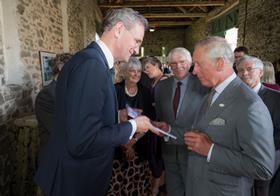
What’s more expensive – a kilo of imported organic apples or a kilo of pesticide-treated fruit? Conventional wisdom might go for the latter, but a groundbreaking pilot programme that my company, Eosta, took part in has found when the ‘true cost’ of production is included in the price, those same apples are 17 pence per kilo more healthy than conventional fruit, which comes with traces of pesticides.
Of course, judged by standard profit and loss measurements, organic fruit with its lower yields untreated with pesticides or fungicides is thought of as the more expensive option. The recently-completed ‘True Cost in Farming & Finance’ pilot programme seeks to show why such thinking is fundamentally flawed.
Supported by HRH Prince Charles, the UN, accountants EY and Triodos Bank, the study is aiming to change the way consumers and retailers view fruit pricing by taking into account the impact on people, planet and ecosystems – that is to say the ‘true cost’ of fruit production.
The pilot programme – the first of its kind for an SME – measured Eosta’s profit and loss results over a one-year period taking into account not just finances, but the impact of food production on soil fertility, climate change, water quality, biodiversity and livelihoods.
One of the findings was that organic apples from Argentina are 17p/kg more healthy or less toxic than conventionally grown apples, which come with traces of pesticides. The European Food Safety Authority (EFSA) keeps track of occasions where apples show up with pesticide thresholds above the MRL. In fact, EY calculated that the negative cost to society of conventional apples from the same source was 19p/kg of apples from Argentina compared with 2p for organic apples, giving the organic option a 17p/kg health advantage.
Another finding was that organic farmers across the board contribute to decreasing the effect of soil degradation and improving soil health by increasing soil organic matter. We found that across the board, organic growers contribute substantially in terms of soil health as opposed to conventional production.
However, in all modesty, we must say that the task is not yet complete. Further research is needed to move forward, professionalise the methodology and be more precise.
Up until now, the whole sustainability discussion has been the exclusive domain of conferences, scientists and thinktanks. Now it’s time to act and to measure our profit in a new way.
The programme is far from finished. Eosta was the first, but retailers and other fruit distributors have already expressed an interest in taking part in the next phase.
Through the pilot programme, we have been able to develop a new dashboard that will empower investors to not only hold companies accountable financially, but also in terms of natural and social capital. This dashboard is desperately needed because we will have a systems failure in our market economy as long as we keep externalising the costs of people and planet.
However, we need future pilot pioneers and colleagues to sharpen the dashboard and come up with additional KPIs and metrics to establish the true cost of food production to people and planet.
But we can only take it so far. We also need governments to help establish a more level playing field and rid us of a system that gives polluters a fake cost advantage by being able to externalise costs. Ultimately we require new laws and fiscal incentives that will make plain the true cost of food in the price that consumers eventually pay in supermarkets. Retailers think they are very efficient and they probably are in their fight for lower prices. But that is only efficiency from a retailer point of view. If you zoom out, it is not efficient at all.



